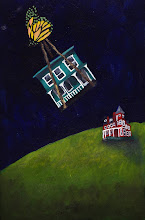
Bad times for curtain manufacturers. A quick look up at any of Manhattan’s latest glossy glass monoliths confirms what ex-drapers have been bawling over for years. Big glass and big windows are big business for big voyeurism these days. You can blame reality TV or develop your own Windex conspiracy theories, but fishbowl luxury is the new calling card for urban living. Are we giving up something more than our privacy by expanding the window to become the wall? Are we losing the balance between security and escape? By lavishing a room with floor to ceiling windows, are we relinquishing the pleasure of a poignantly placed pane or portal? If walls are the foundational building blocks, cordoning off the spaces we live in, are windows really an exception we’d like to turn into a rule?
I’ve been buried in a book my musician friend Noah Jarrett lent me, entitled Migration by W.S. Merwin. This Pulitzer Prize winning American Poet writes beautifully musky, romantic, and borderline mystical narratives of private thoughts and shockingly commonplace discoveries. His poems are more curiously gnarled roots than whimsical flowers. In the sections I’ve passed through so far, he several times wades through the personification of shelter, light, windows, and sky---sometimes as objects, other times as characters responsible for their own actions.
V. A Window is Taken
(from The Removal)
I call leave me here
the smoke on the black path
was my children
I will not walk
from the house I warmed
but they carry me through the light
my blackening face
my red eyes
everywhere I leave
one white footprint
the trackers will follow us into the cold
the water is high
the boats have been stolen away
there are no shoes
and they pretend that I am a bride
on the way to a new house
As part of his suite The Removal, Merwin creates a window character whose protestations to being held hostage are both proud and tragic. “I will not walk from the house I warmed,” evokes a tenderness we wouldn’t normally associate with a pane of glass. The old adage ‘if these walls could talk’ usually implies the house as a passive observer, but when our window narrator recalls that “the smoke on the black path was my children,” we can feel quite the subjective sense of responsibility and longing. The final line is what really gets me though, when she bitterly adds “and they pretend that I am a bride on the way to a new house.” Perhaps there is a warning here against callous recycling: regardless of the ecological benefits, some things only belong the first time around.
Under Black Leaves
In one window
old moon swollen with our shadow
bringing it
to birth one more time
in another window
one of the stars that does not know it is the south
the bird’s way…
In Under Black Leaves, Merwin sets a gorgeous nocturnal scene, this time from within the house. “In one window,” an unspecified narrator observes, the “old moon swollen with our shadow” appears. But across the room “in another window one of the stars that does not know it is the south” lies in wait. Whereas the prospective glass-tower investor can browse any e-tour from any conceivable angle in any conceivable Starbucks hotspot, the reader here is taken—by way of very minimal language—on a journey through this room from one end to the other. Never mind he fails to mention that between these two window panes are the woven rugs or dusty floorboards, creaking rocking chairs or chilled-chrome kitchen chairs, the beaten down sofa or double fluffed king-size mattress. Important is that we are all IN this room, and that while traveling the distance between this imagery of opposite window views (north and south, alpha and omega), we have all recalled and/or created an experience along the way. Without drafting one scribble on a blueprint, Merwin has reminded us why we build window in the first place: to enjoy what is just beyond them.
While I’m not sure how floor-to-ceiling his own sitting room’s vistas are, his charming and melancholy meditations of literary windows and sky are astoundingly clear.
-JESSE NEUMAN





No comments:
Post a Comment